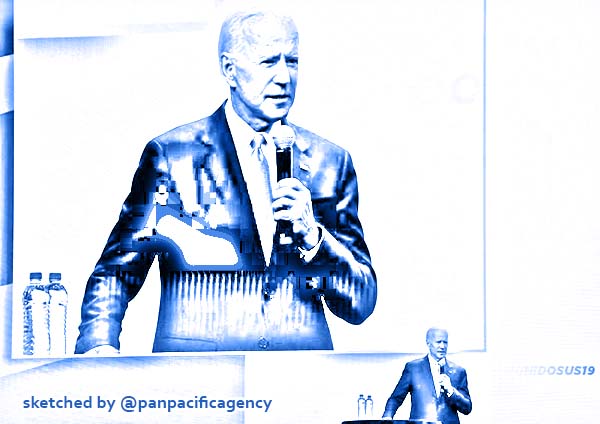[Analytics] Hong Kong’s economic future will be safer under a Joe Biden presidency

Democratic 2020 presidential candidate and former U.S Vice President Joe Biden speaks at the UnidosUS Annual Conference, in San Diego, California, U.S., August 5, 2019. REUTERS/Mike Blake. Sketched by the Pan Pacific Agency.
Calm minds on both sides know China and the US need each other because they are more economically linked than militarily opposed, unlike the Cold War. Hong Kong’s economic future remains in the hands of the superpowers, with a Biden presidency less likely to cause unwelcome fallout. Richard Harris specially for the South China Morning Post.
British prime minister Harold Wilson said in 1964 that “a week is a long time in politics”. And in 1886, politician Joseph Chamberlain said: “In politics, there is no use in looking beyond the next fortnight.” In 2020, I shall try to look over the next five months to see how Hong Kong might fare with the next US president.
Current US president, Donald Trump, who pre-coronavirus looked unbeatable, seems to be imploding. He is a man who can take pressure, but the burdens of office will wear anyone down – especially a man with the capriciousness to upset the apple cart soon after having gutted the fruit shop. The sight of him looking exhausted after his unsuccessful political rally in Oklahoma was telling.
Two weeks ago, I would have said Trump would easily beat Democratic presidential candidate Joe Biden, but a fortnight is a long time in politics. Biden is an uninspiring, long-term politico who has shown few leadership skills. This election is Trump’s to lose.
A scrapping Trump is a great campaigner, a victorious Trump vainglorious, but a losing Trump with his back to the wall is likely to intensify a stream of name-calling, backbiting, spiteful and divisive tweets which could turn voters against him.
The explosive kiss-and-tell book by John Bolton, Trump’s former national security adviser, went viral over the weekend as soon as a judge granted permission for it to be published, against the wishes of the White House.
It turns out White House meetings debating serious geopolitical issues, such as Iraq or Syria, are often derailed by Trump ranting about unrelated topics.
Bolton reports several impeachable offences, like discussing domestic political and legal interference in US affairs with foreign leaders. He claims Trump buttered up President Xi Jinping about detaining Uygurs on terrorist offences because criticism or sanctions could have interfered with trade negotiations.
Bolton served Ronald Reagan and two Bushes as well as Trump, and he appears genuinely shocked at the lack of administration within the administration.
He points out the chilling fact that if Trump is re-elected, he will not have the constraint of even trying to be popular and would run the country where his maverick, unpredictable and unreliable first thoughts would take him.
Trump will disobey all the rules of politics in election season in terms of being a friend to everybody – he has offended many and is actively opposed by more. That is not a good place to be when you want to win the middle ground.
The enthusiasm is fading from Trump rallies. He is under attack from new quarters, and his inept handling of the coronavirus has exposed a businessman-politician, not a statesman.
The US election will be critical to Hong Kong’s economy. Calm minds on both sides know China and the United States need each other because they are more economically linked than militarily opposed – unlike the Cold War.
Will America choose a man who thrives on conflict and unpredictability, or will the man who has no visible original thoughts lead the country into a difficult decade? I’m guessing the American electorate will say it’s time for a change.
Under a Biden presidency, there is likely to be a thawing of relations as both sides try to make up and maybe resuscitate the phase one Sino-American trade deal. That is at least nine months away, so investors will have to wait.
However, Trump’s legacy is that he broke the spell that bound Barack Obama from criticising China on trade matters. He has inspired a wide suspicion of China across the aisle, so trade talks may be more cordial but no easier.
White House trade adviser Peter Navarro said on Monday that the phase one trade deal with China was “over”. The markets responded badly, with the Hong Kong and S&P 500 indices dipping immediately. Navarro soon retracted or clarified the statement and Trump tweeted to confirm, “The China Trade Deal is fully intact”.
Markets quickly recovered, but the volatility is a clear indicator of how they still fear the narrative on trade. It is still foremost in the minds of investors.
Bolton’s revelation of the alleged conversation Trump had with Xi underlines how important the trade deal was to Trump. He is not going to prematurely write it off, even if the economic shutdowns have ironically favoured China’s balance of trade.
Trade is critical to Hong Kong’s economy, which is why our special status with the US is so important. The early furore about the national security law has died down, and the initial limits to its use so far announced might stabilise the flow of negative news and stay the hand of the US in ending Hong Kong’s status.
Our economic future remains in the hands of the superpowers, with a Biden presidency less likely to cause unwelcome fallout. On our part, Hong Kong needs to stay out of the news. Ill-judged arrests and trials ordered from Government House are an extra economic risk that we don’t need.
Richard Harris is chief executive of Port Shelter Investment and is a veteran investment manager, banker, writer, broadcaster and financial expert witness.